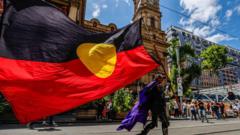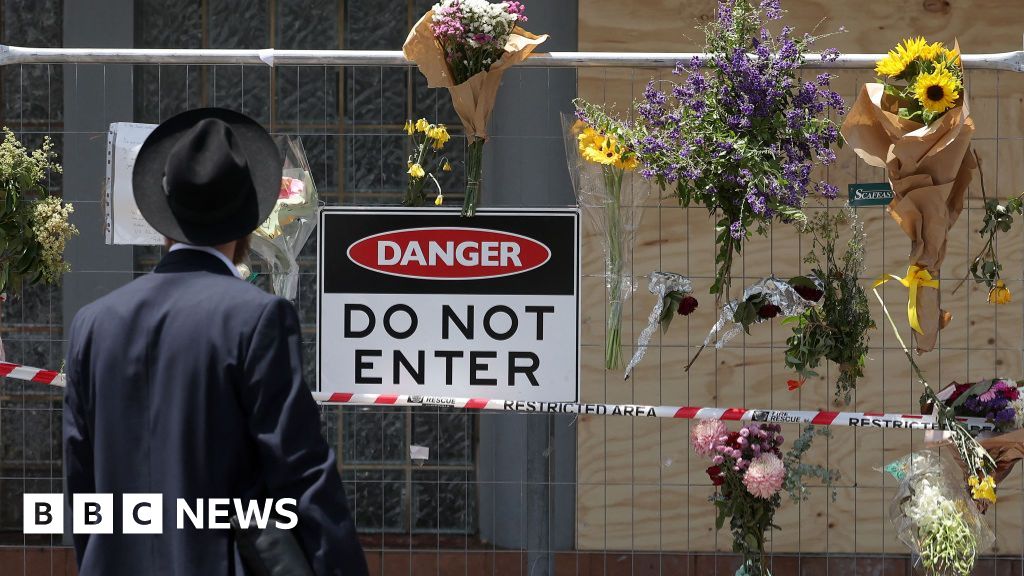In the small Indigenous town of Yarrabah, the absence of political engagement is palpable as the Australian election looms. With no campaign posters or candidate visits in sight, community leaders express their frustration at the continued neglect of Aboriginal issues. Suzanne Andrews, chief executive of Gurriny Yealamucka Health Services, noted the glaring absence of discussion surrounding Indigenous concerns during recent debates between Prime Minister Anthony Albanese and Opposition leader Peter Dutton. She questioned, “What the hell's going on?”
Native Australians, who constitute about 3.8% of the nation’s 26 million, are disproportionately disadvantaged, a plight previously described by politicians as a "national shame." However, this election cycle has seen a stark decline in dialogue regarding First Nations issues. The recent remarks by Dutton regarding Indigenous "welcome to country" ceremonies, deemed "overdone," were largely seen as the only relevant comment on Aboriginal affairs, framed instead within a divisive cultural context.
Political reluctance to address Indigenous matters has been attributed to the fallout from the failed Voice to Parliament referendum of 2023, which aimed to recognize First Nations peoples constitutionally and provide them with a political voice. The overwhelming rejection of the proposal by 60% of voters has created a climate of political caution; leaders appear hesitant to engage in discussions that could alienate constituents. Many believe these issues are now regarded as electorally risky, leading to the current silence on Aboriginal policy matters.
According to prominent anti-Voice campaigner Warren Mundine, the current election atmosphere reflects a disengagement from Aboriginal issues post-referendum. He lamented the lack of any Aboriginal policy discourse, marking this election as unusually devoid of meaningful conversations regarding Indigenous rights and policies. This sentiment was echoed by independent Senator Lidia Thorpe, who criticized Albanese for avoiding Indigenous discussions due to the failed referendum.
Despite ongoing strategies like the Australian government's Closing the Gap initiative, aimed at addressing Indigenous disadvantage, many of its targets remain unmet, with recent trends showing an increase in incarceration rates for Aboriginal and Torres Strait Islander peoples. University experts warn that, with Indigenous policies falling off the election agenda, political parties risk sidelining critical issues that continue to impact First Nations communities.
In light of these developments, there is a palpable sense of disillusionment among Indigenous Australians. Reports have surfaced regarding a worrying increase in racism directed at First Nations individuals following the referendum, and many community members are opting out of political discussions altogether, believing that current leaders cannot facilitate genuine dialogues.
As the country approaches the election, voices from within the Indigenous community are calling for greater visibility and acknowledgment of their rights and needs. Many feel that political conversations should reflect the ongoing injustices they face, emphasizing that simply avoiding these topics does not address the serious challenges ahead.
Native Australians, who constitute about 3.8% of the nation’s 26 million, are disproportionately disadvantaged, a plight previously described by politicians as a "national shame." However, this election cycle has seen a stark decline in dialogue regarding First Nations issues. The recent remarks by Dutton regarding Indigenous "welcome to country" ceremonies, deemed "overdone," were largely seen as the only relevant comment on Aboriginal affairs, framed instead within a divisive cultural context.
Political reluctance to address Indigenous matters has been attributed to the fallout from the failed Voice to Parliament referendum of 2023, which aimed to recognize First Nations peoples constitutionally and provide them with a political voice. The overwhelming rejection of the proposal by 60% of voters has created a climate of political caution; leaders appear hesitant to engage in discussions that could alienate constituents. Many believe these issues are now regarded as electorally risky, leading to the current silence on Aboriginal policy matters.
According to prominent anti-Voice campaigner Warren Mundine, the current election atmosphere reflects a disengagement from Aboriginal issues post-referendum. He lamented the lack of any Aboriginal policy discourse, marking this election as unusually devoid of meaningful conversations regarding Indigenous rights and policies. This sentiment was echoed by independent Senator Lidia Thorpe, who criticized Albanese for avoiding Indigenous discussions due to the failed referendum.
Despite ongoing strategies like the Australian government's Closing the Gap initiative, aimed at addressing Indigenous disadvantage, many of its targets remain unmet, with recent trends showing an increase in incarceration rates for Aboriginal and Torres Strait Islander peoples. University experts warn that, with Indigenous policies falling off the election agenda, political parties risk sidelining critical issues that continue to impact First Nations communities.
In light of these developments, there is a palpable sense of disillusionment among Indigenous Australians. Reports have surfaced regarding a worrying increase in racism directed at First Nations individuals following the referendum, and many community members are opting out of political discussions altogether, believing that current leaders cannot facilitate genuine dialogues.
As the country approaches the election, voices from within the Indigenous community are calling for greater visibility and acknowledgment of their rights and needs. Many feel that political conversations should reflect the ongoing injustices they face, emphasizing that simply avoiding these topics does not address the serious challenges ahead.



















